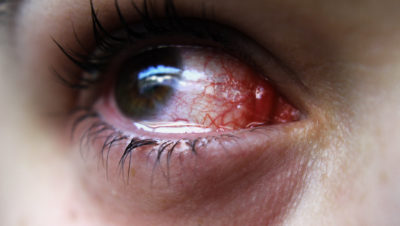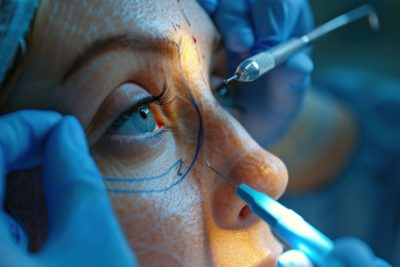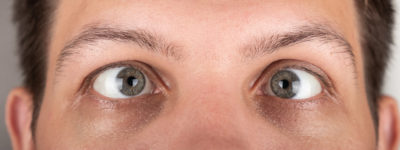Thyroid Eye Disease (TED), also known as Graves’ eye disease or Graves’ ophthalmopathy, is an autoimmune condition that affects the eyes and is commonly associated with an overactive thyroid gland (hyperthyroidism). It is important to identify the signs and symptoms of TED early to initiate proper treatment and prevent complications. Here is an overview of TED, its signs, and available treatment options:
Signs and Symptoms:
Eye Bulging (Proptosis):
One of the most noticeable signs of TED is the protrusion of one or both eyes. This occurs due to inflammation and swelling of the eye muscles and tissues behind the eyes.
Double Vision (Diplopia):
TED can lead to misalignment of the eyes, causing double vision, especially when looking in different directions.
Eye Irritation:
TED often causes redness, dryness, and a gritty sensation in the eyes. This can lead to excessive tearing or a feeling of foreign objects in the eyes.
Eyelid Swelling:
Swelling of the eyelids, known as eyelid retraction, can occur, giving the eyes a wide-open or staring appearance.
Pain or Pressure:
Some individuals with TED experience pain or pressure around the eyes, especially when moving them.
Difficulty Closing Eyes:
In severe cases, TED can make it challenging to fully close the eyelids, leading to exposure of the cornea, which can result in corneal damage.
Thickening of the Skin:
Skin around the eyes may become thickened and reddened.
Changes in Vision:
TED can cause changes in visual acuity, and in severe cases, it may lead to vision loss.
Treatment Options:
The treatment of TED typically depends on the severity of the disease and the specific symptoms. Here are some common treatment options:
Monitoring:
In mild cases, TED may not require immediate treatment but will be monitored by an ophthalmologist.
Steroid Therapy:
Oral or intravenous steroids can help reduce inflammation and relieve symptoms. However, long-term use of steroids can have side effects.
Orbital Radiation:
Radiation therapy may be used in certain cases to reduce inflammation and control eye bulging.
Surgery:
Surgical interventions may be necessary for severe TED to correct eye misalignment, relieve pressure, or improve eyelid function. Procedures may include orbital decompression, strabismus surgery, or eyelid surgery.
Tear Replacement Therapy:
Artificial tears and lubricating eye drops can alleviate dryness and irritation.
Smoking Cessation:
If the patient is a smoker, quitting smoking is crucial, as it can worsen the condition.
Thyroid Management:
Managing the underlying thyroid condition, often through medications or radioactive iodine therapy, can help control TED progression.
Supportive Measures:
Using sunglasses to protect the eyes from UV rays, maintaining good eyelid hygiene, and avoiding eye strain can also help manage symptoms.
It’s essential for individuals experiencing any symptoms of TED to seek prompt medical attention from an ophthalmologist or an endocrinologist. Early diagnosis and appropriate management can significantly improve the prognosis and quality of life for those affected by this condition. Additionally, ongoing research continues to explore new treatment options for TED, so patients should stay informed about the latest developments in its management.
Emotional and Psychological Support:
Thyroid Eye Disease can have a significant impact on a person’s physical appearance and overall well-being. It’s essential to recognize the emotional and psychological toll it can take. Patients may benefit from support groups or counselling to cope with the emotional aspects of living with TED.
Lifestyle Modifications:
Patients with TED should consider making certain lifestyle changes to help manage the condition and reduce its impact:
Diet:
A well-balanced diet can support overall health and thyroid function. Ensure you’re getting enough iodine, selenium, and other essential nutrients.
Stress Management:
High stress levels can exacerbate TED symptoms. Practising stress-reduction techniques like meditation, yoga, or deep breathing exercises can be beneficial.
Eye Protection:
Wearing wrap-around sunglasses and avoiding exposure to harsh environmental conditions can protect your eyes from further irritation.
Regular Follow-ups:
Continue to see your healthcare providers regularly for check-ups, even after symptoms have improved. TED can have a relapsing and remitting course, so ongoing monitoring is crucial.
Research and Future Developments:
Medical research into Thyroid Eye Disease is ongoing, with scientists and clinicians continually exploring new treatment options and better understanding the underlying mechanisms of the disease. This research may lead to more effective therapies and improved outcomes for individuals with TED.
Prevention:
While TED is primarily an autoimmune condition, managing underlying thyroid issues is crucial for prevention. If you have a known thyroid condition, working closely with an endocrinologist to stabilise thyroid hormone levels can potentially reduce the risk of developing TED or limit its severity.
Why Choose Dr. Agarwal’s Eye Hospitals for Thyroid Eye Disease Care?
Dr. Agarwal’s Eye Hospitals stands out as a premier choice for Thyroid Eye Disease (TED) care due to our unwavering commitment to comprehensive patient support. Our highly skilled team of ophthalmologists specialises in the diagnosis and treatment of TED, possessing an in-depth understanding of the condition’s nuances
and its impact on eye health. With cutting-edge technology and state-of-the-art facilities at our disposal, we ensure precise diagnostics and offer the most effective treatment options available. What sets us apart is our dedication to personalised care, tailoring each TED treatment plan to your specific needs, thereby ensuring the best possible outcomes.
In recognition of the multidimensional nature of TED management, we collaborate seamlessly with other specialists, including endocrinologists, providing a holistic approach to your care. Above all, your well-being and comfort remain our paramount concerns, and we strive to create a compassionate and supportive environment throughout your entire treatment journey. When you choose Dr. Agarwal’s Eye Hospitals, you choose excellence, expertise, and patient-centred care for your TED needs.









